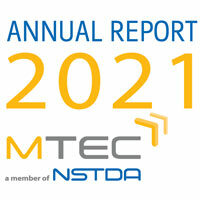
Dr. Pasu Loharjun
Chairman of MTEC Executive Board
It has been about 2 years since Thailand and all countries around the world have been facing the continued spread of COVID-19. The disease has created widespread impacts, so a large number of people have to adopt the New Normal for their lifestyles and work practices, such as utilizing information technology (IT) more frequently with their work and changing their consumption behaviors. As for the manufacturing and service sectors, it is important that they have to adapt their business plans. The businesses that faced negative impacts must reconsider their production plans and supply chain management by taking into account the risk of using raw materials from a single source. Meanwhile, certain businesses may experience significant increase in demand, especially products related to health care and epidemic prevention.
As MTEC is an R&D center in materials technology, its related design and manufacturing works are affected by the COVID-19 as well. Therefore, the organization has adjusted its research plan to create inventions to cope with the COVID-19 disease, for examples, the ‘PETE’ Patient Isolation and Transportation Chamber, the remote-controlled delivery cart ‘Aree’, and the RT-Wheelchair, as well as adapted its work styles in order to deliver the research results to the target users effectively.
At present, the spread of the COVID-19 has made health care and pandemic prevention as the country’s first priority. This response has resulted in an increase in the use of single-use products and, inevitably, a large amount of wastes. At the same time, the trend in environmental sustainability is still strong as well as the demand for ever more efficient waste management is needed. In foreign countries, environmental measures are being proposed since they will be more crucial when the pandemic crisis subsides. MTEC, therefore, has followed closely the establishment of the standards and measures on the environmental issues, namely, the EU Green Deal, ISO 59020 “Measuring and assessing circularity” and planed for the necessary steps to support Thai entrepreneurs.
Apart from the environmental issues, MTEC has planned to develop research works that meet the adaptation of the manufacturing and service sectors, as well as prepared for various new lifestyles conforming to the BCG (Bio-Circular-Green) Economy Model, such as boosting the productivity with automatic system, using additive manufacturing to increase the flexibility of production and inventory management, creating value-added from agricultural and industrial wastes, as well as giving importance to the elderly care. All these actions have been done through focusing on working with the manufacturers to deliver the works useful to the target groups and deliver outputs in various forms to create appreciable socio-economic impacts for the country.
